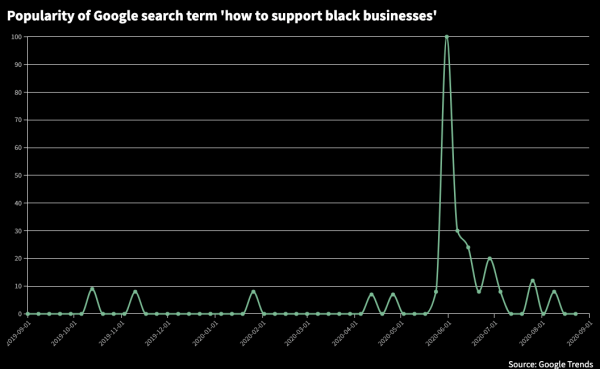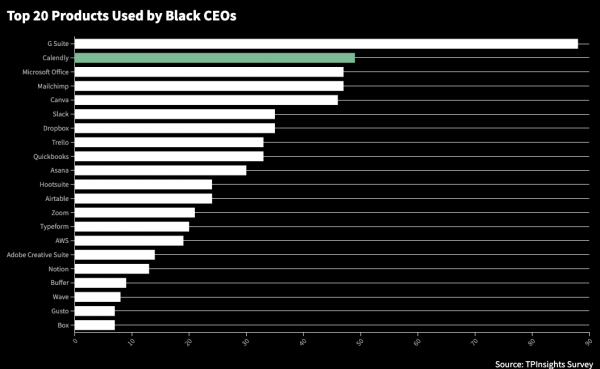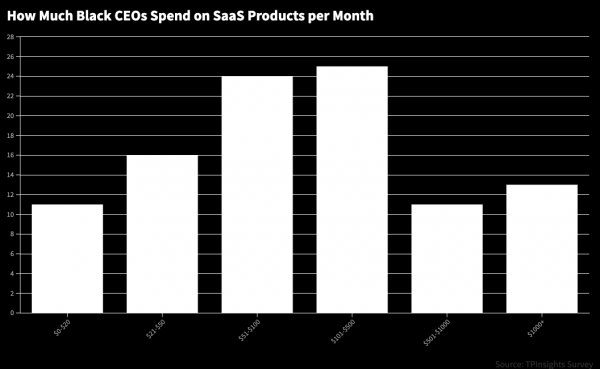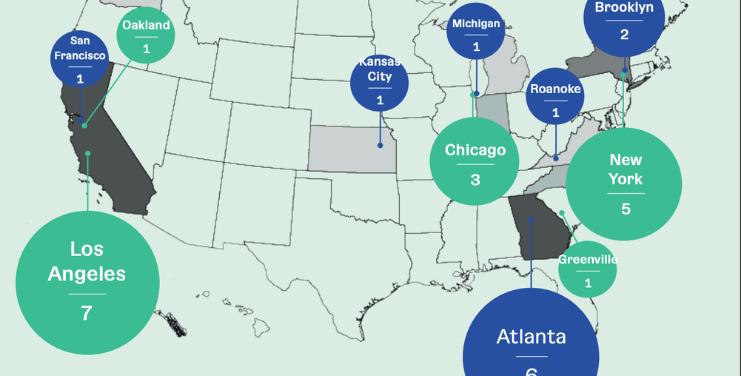In an attempt to demonstrate solidarity with Black Americans facing the grief and gruesome outcomes of COVID-19 health disparities, rising protests against racial injustice and the killing of several Black people, as well as the devastating 41 percent loss of Black businesses, the media released a flurry of articles and listicles directing consumers to Black consumer brand products.
Search terms like Black-owned business near me and how to support Black businesses peaked on Google. In June, searches for Black-owned businesses on Yelp increased to 25 times the number of searches at the same time the year prior.

And yet, while Black consumer goods and retail saw its 15 minutes of recognition, left out of the massively timely directories were the platform experiences that are increasingly powering our businesses, lives, and experiences.
Our team decided to explore which companies Black founders were finding themselves supporting and using to grow their own companies, how much they were spending, and their sentiment on whether or not they feel aligned in their principles with companies who have or have not made statements related to the Black Lives Matter movement or other adjacent racial justice stance.
We surveyed 107 Black founders and CEOs about which software products they subscribe to (paid or unpaid) to power their own companies. Out of the top 20 most used products by Black founders, only one of the most widely used SaaS tools has a Black CEO: Calendly.

Black founders are also spending substantial amounts of money on these products each month. 45.8% of the respondents said that they spend more than $100 a month on these products, with 12.1% saying they spend more than $1,000 a month.

Beyond desiring to use more Black-owned software company, Black CEOs are silently diligent about purchasing services and products by Black vendors for their businesses as common practice. Kelli N. Jones, CEO, and founder of Be Nimble Foundation in Indianapolis, Indiana, said that before it became trendy, through her work, supporting Black founders over the last 4 years was common practice. Ashlee Ammons, co-founder, and CEO of Mixtroz, also a survey respondent, said that while she saw the value in seeking out Black-owned software products for her workplace, there are few options.
These big products in tech, not many are Black-owned. That’s a big problem for my company too, as I own a software company. I don’t think people think of Black-owned for software products, said Ammons. Just 11 days after the death of George Floyd, Forbes published an article entitled ‘100 Black-owned businesses to support ‘. In the article, companies are listed under the categories, cosmetics, haircare, fashion, finance, food & beverage, media, retail, wellness, or other.
A similar trend can be seen in outlets like Marie Claire article, or this Oprah Mag article which crept to the top of Google search for Black-owned businesses. There were no categories for ‘software ‘ or ‘tech ‘. In the tech space, it doesn’t exist yet where you ‘re like ‘oh, I don’t like Pepsi, I’m gonna go to Coke ‘. That doesn’t exist yet because all of the power is held by so few, explained Ammons. Take the example of email marketing. Mailchimp, which was the third most popular software from our survey, currently takes up 60% of the email marketing market share by some estimates. Mailchimp also has a non-Black founder. Even if a consumer has an interest in making sure they use Black-owned software, the other options in the example of email marketing aren’t great.
Our survey gave respondents the chance to list what programs they use that may not have been included. Other than Mailchimp, the companies that were listed that offer some form of email marketing were Hubspot, Constant Contact, SendinBlue, Zoho, and AWeber. None of these companies have Black CEOs or founders. Of the top 20 software tools used by Black founders, we identified that all but one made public statements in support of Black lives and racial justice. Out of the 19 that made public statements, only 11 have publicly released their diversity and inclusion data.
Those 11 companies averaged a workforce representation of just 3% Black employees. Still, these issues remain important to Black founders. I’ve always checked to see how diverse their teams are, even before the renewed focus on Black Lives Matter. I can’t say that I’ve checked to see if they’ve made statements because a statement is nice, but seeing actual change and action is what I’m more concerned about, said Jones.
For companies leading the charge on challenging racial inequity on a national level and internally, having the knowledge of who their customers are and their values could be advantageous for Black founders making financial commitments to their tools and resources.
Escaping this reality isn’t entirely possible particularly when the market share of services is dominated by a select few, and businesses of all kinds are particularly dependent on driving traffic to their products through platforms like Facebook or Google. This lack of choice is just one example among many that lead Black founders to using products predominantly owned by white CEOs, and in some cases, products owned by CEOs who haven’t even voiced their support of Black lives yet. The lion ‘s share of venture capital money goes to tech companies, while only 1% of venture-backed startups are Black. Ammons pointed to this issue as the main reason many of the products she uses are not Black-owned. Most of the companies that I listed are not Black-founded. That’s a problem. Until Black founders are able to get equitable funding to scale to the size of the Slacks and the Canvas of the world, this will continue to be a problem.








